GIPC CEO promotes Ghana's EV investments in China
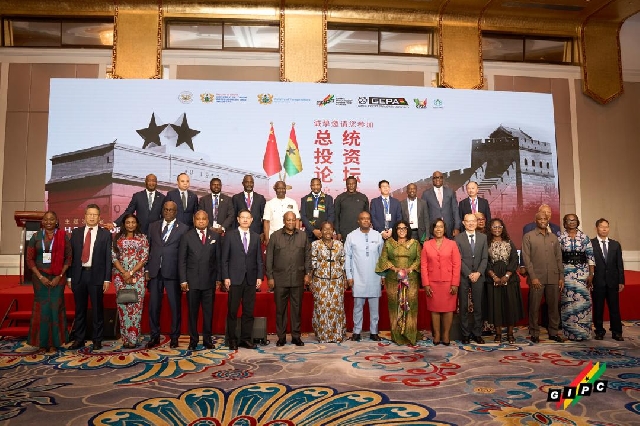 GIPC boss in China
GIPC boss in China
The Chief Executive Officer of the Ghana Investment Promotion Centre (GIPC), Mr Simon Madjie, has urged Chinese companies to partner with Ghana in transforming the country into a hub for electric vehicle (EV) manufacturing, assembly, and maintenance across West Africa and the continent.
He noted that Ghana aims to achieve approximately 70% EV adoption by 2045 and establish 1,000 charging stations by 2028.
“As of August 2025, only seven public charging stations have been installed. We invite you to invest in this emerging market,” Mr Madjie stated.
He made the remarks during a presentation to Chinese business leaders, policymakers, and investors at the Presidential Investment Forum in Beijing, held on the margins of President John Dramani Mahama’s state visit to the People’s Republic of China.
Organised in collaboration with the Ministry of Trade, Agribusiness, and Industry (MOTAI), the Ministry of Foreign Affairs (MOFA), the Ghana Export Promotion Authority (GEPA), the Ghana Free Zones Authority (GFZA), and the China-Africa Business Council, the forum served as a strategic platform to deepen economic cooperation between Ghana and China.
It also forms part of Ghana’s broader agenda to attract high-impact investments in manufacturing, energy, and technology, among others.
Strategic Investment Destination
Mr Madjie highlighted Ghana’s strategic location as a gateway to West Africa, its robust investment incentives, and tailored policies that support EV assembly, battery production, and component manufacturing.
He emphasised the country’s abundant renewable energy resources, skilled workforce, and proximity to key mineral deposits essential for EV supply chains.
China’s Zero-Tariff Policy
He also underscored the transformative potential of China’s zero-tariff policy on Ghanaian exports, describing it as a launchpad for industrial expansion and global market access. The policy allows goods of Ghanaian origin to enter the Chinese market duty-free.
“For Chinese investors, manufacturing in Ghana opens seamless access to one of the world’s largest consumer markets,” he said.
Mr Madjie showcased Ghana’s industrial parks and special economic zones, including the Dawa Industrial Zone and Appolonia City, as prime locations for EV assembly plants, battery production, and other strategic industries.
He also cited Ghana’s progressive automotive policy, which offers incentives for local value addition, technology transfer, and sustainable innovation.
Chinese Investments in Ghana
He noted that under Ghana’s free zones regime, many Chinese companies have established operations in key sectors, including oil and gas, iron and steel, ceramics, plastics, paper, and construction, to produce and export to global markets.
Mr Madjie highlighted KEDA and Sunda International as leading Chinese export-oriented companies in Ghana, leveraging the African Continental Free Trade Area (AfCFTA) and ECOWAS trade protocols.
With a combined global investment exceeding US$2 billion, he said, Sunda and Twyford International operate in 13 countries and maintain factories across three regions in Ghana, creating over 10,000 direct jobs and more than 30,000 indirect jobs.
This presentation in Beijing builds on GIPC’s earlier high-level engagements in Japan and Singapore, aimed at promoting Ghana’s Reset Agenda. Emphasis was placed on the Volta Economic Corridor under the 24-Hour Economic and Accelerated Development Programme, as well as the Big Push Agenda and its related investment opportunities.
Source: Classfmonline.com/Cecil Mensah
Trending Business

Ghana Post charts new path for growth and digital transformation at staff durbar
14:59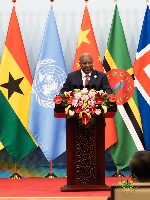
President Mahama woos Chinese investors
14:45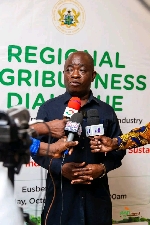
Gov't to waive taxes on agro-processing machinery to boost agribusiness growth
12:19
President Mahama announces pro-enterprise reforms to attract foreign investment
13:13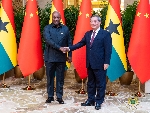
Ghana, China to finalise zero-tariff trade agreement — President Mahama
11:07
GIPC joins trade delegation at Burkina Faso forum
11:18
Ghana launches first-ever National Occupational Safety and Health profile to promote safer workplace
17:48
Ghana, Burkina Faso deepen trade and investment ties at Ouagadougou forum
11:15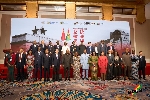
GIPC CEO promotes Ghana's EV investments in China
16:47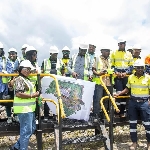
Zambian delegation visits Tarkwa Goldfields to study Ghana’s mining best practices
01:52



